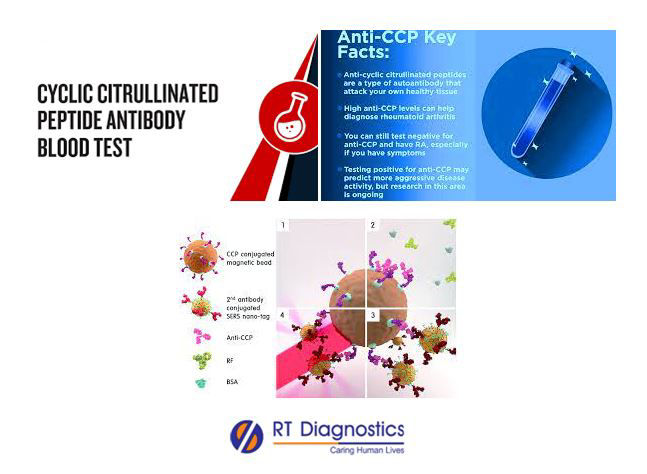Citrulline Screen - Serum
Citrulline protein is an antibody that is associated with Rheumatoid Arthritis. This test is called as Anti-Citrulline Antibody or Anti-CCP. This test evaluates the citrulline antibodies in the blood, helps to diagnose Joint inflammation and Rheumatoid Arthritis.
Citrulline Antibody:
Why Citrulline antibody Test?
CLINICAL INFORMATION
Citrulline antibodies are present in the blood of most patients with rheumatoid arthritis. Citrulline antibody test helps to evaluate patients with unexplained joint inflammation. Cyclic-Citrullinated Peptide (CCP) auto-antibodies are synthesized (defective immune system in conditions such as RA -rheumatoid arthritis) against CCP in Rheumatoid arthritis. Apart from these positive test results for RF and Anti-CCP antibody tests, even seronegative cases (without the presence of antibodies against CCP or RF) are present with rheumatoid arthritis. These levels can be elevated in rheumatologic conditions associated with inflammatory arthritis, such as systemic lupus erythematosis (SLE). Anti-citrullinated protein antibodies (ACPAs) are autoantibodies that are directed against proteins that are citrullinated is a useful tool for diagnosis, as it serves a bio-markers in the majority of rheumatoid arthritis patients. During inflammation, the amino-acid arginine is converted into citrulline protein - vimentin (citrullination). Vimentin is secreted and citrullinated by macrophages in response to apoptosis or by pro-inflammatory cytokines such as tumor necrosis factor-alpha (THF-alpha). Hence genetically modified citrullinated-vimentin (MCV) is used in ELISA to detect Rheumatoid arthritis patients. The specimen of choice for the detection of Rheumatoid Arthritis is synovial fluid. The synovial fluid analysis is also known as joint fluid analysis may be ordered to help diagnose the cause of joint inflammation, pain, swelling, and fluid accumulation. The function of the synovial fluid is to supply nutrition and disposal of metabolic end products, lubricate the joints and absorb shock. Diseases associated with synovial fluid are of two types inflammatory type and non-inflammatory type. This test analysis checks for changes in the physical properties like color, viscosity and screens for changes in the fluid’s biochemical composition. Determination of inflammatory in-filtrate is detected by adding acetic acid to the synovial fluid specimen. If mucin clot is formed it shows the presence of inflammatory cells. Estimation of lactate levels in septic arthritis. Microscopic analysis for the presence of monosodium urate crystals (gout), calcium phosphate (pseudo-gout), corticosteroid crystals and hydroxyl apatite crystals (detected by alizarin red stain), smear study in the synovial fluid specimen for detection of acid-fast bacilli. Symptoms of Rheumatoid Arthritis include pain, stiffness, swelling, cracking sound (since synovial fluid level reduces to fill the expanding volume of the joints negative pressure is formed and carbon-di-oxide gets filled up in the space and this bubble formation is called cavitation leading to crackling sound), etc. Symptoms of rheumatoid arthritis are joint pain, joint stiffness, joint swelling, loss of cartilage, and loss of joint function and deformities. Other tests include ESR and CRP helps to access measure inflammation, X-rays, MRI scans, etc.

General Instructions:
Sample Requirement: Specimen - Blood sample collected from the vein. Test Preparation: None.
NOTE - Sample for specimen collections may vary based on the patient’s condition/cases according to the patient’s presenting complaints/signs or symptoms:
SPECIMEN REQUIREMENT (Special or Rare Cases) - As instructed and guided by Physician / Clinician / Pathologist / as per Laboratory’s requirements, according to procedures and protocols.
Sample Requirement: Blood Sample taken from the vein
Test Preparation: None
This Multi-Specialty Clinical Referral Laboratory RT DIAGNOSTICS provides precise and accurate tests with an extensive range of testing services to the medical centers to help in the diagnosis and identification of pathology in the test specimens for infectious diseases and also to evaluate the function of organ systems of the patient. It prevents further complications and helps to stabilize and restore health to near normalcy at the earliest without delay.



